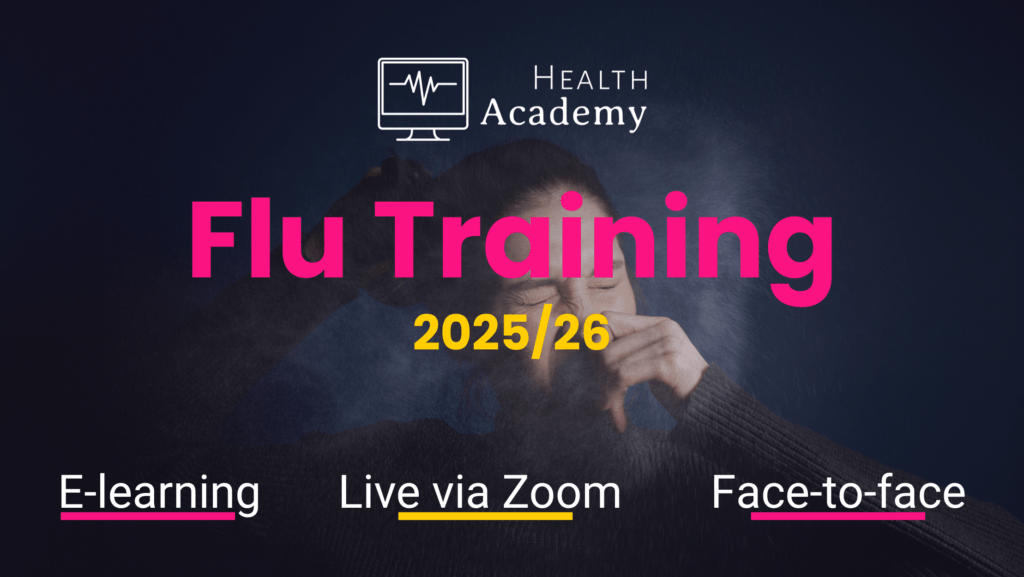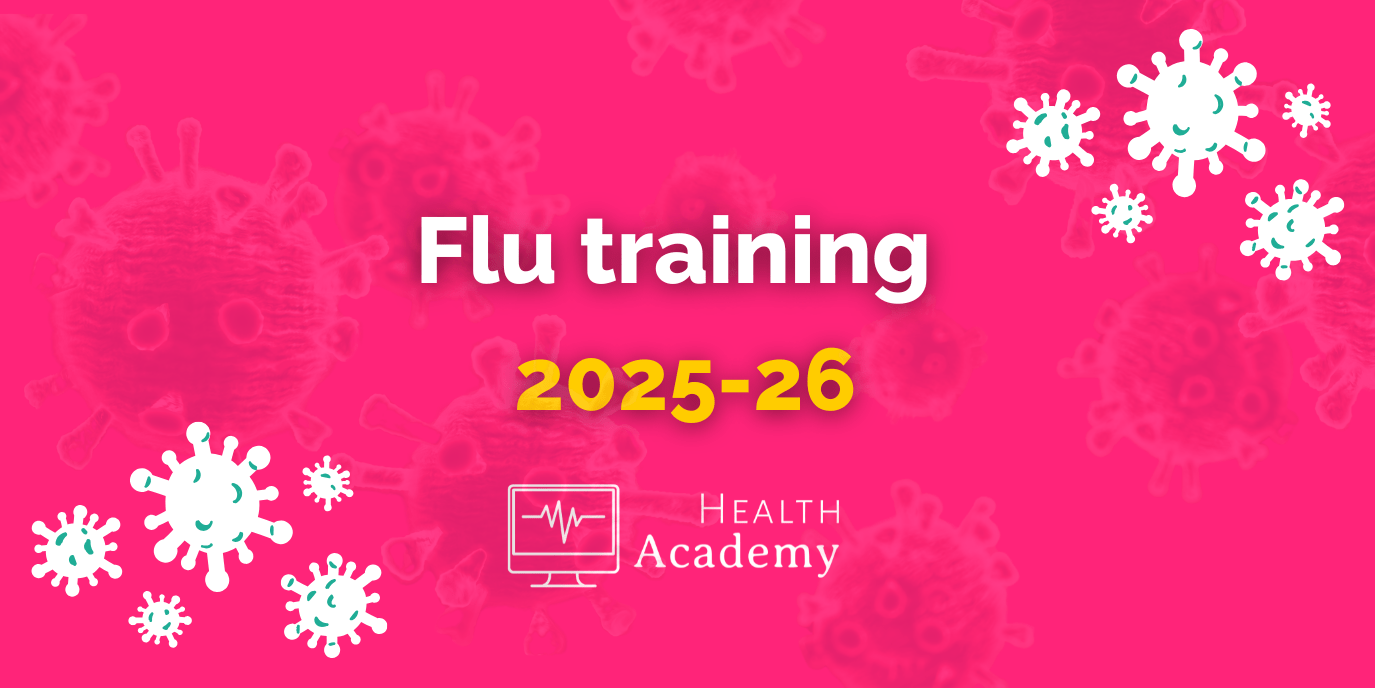
It’s no surprise to any healthcare worker that flu continues to be a serious issue across the UK. Between 2022 and 2024, there were more than 18,000 flu-related deaths, and NHS data shows that flu cases have flu cases have risen sharply in recent seasons, placing even more pressure on our already overstretched healthcare system. Winter pressures aren’t new, but the scale and intensity are increasing, with flu being one of the key contributors. Public awareness is a big part of the solution, but what often gets overlooked is how crucial it is for healthcare professionals to stay up to date with flu vaccination training. Being trained, confident, and current with the latest guidance can protect not only your patients but also your colleagues, your family, and yourself.

The flu isn’t standing still. Each year brings different circulating strains and different groups at risk, which means each flu season comes with a new set of challenges. Some people may be doing flu training for the first time, while others might just need a refresher. Either way, keeping your skills and knowledge updated means you’re ready for whatever the season throws at you.
Training helps you recognise symptoms early, understand how flu spreads, and protect those most at risk. It also gives you insight into how flu co-infections with other viruses like COVID-19 can complicate patient care. Having the right knowledge can help reduce unnecessary hospital admissions and complications, which in turn eases the strain on local services.
Flu training is more than just learning how to give an injection. It’s about knowing how to store vaccines properly, manage consent, deal with side effects, and have open, honest conversations with patients. It covers how to handle vaccines safely and how to react quickly and effectively if someone experiences an adverse reaction. And if you’ve never managed anaphylaxis before, that’s where training becomes absolutely essential.
As well as covering essential background knowledge, flu training gives you the practical skills and confidence to safely administer injections, which helps reduce public anxiety around needles and reassures patients throughout the vaccination process.

Since the COVID-19 pandemic, there has been a clear rise in public scepticism around vaccines. More people are asking difficult questions or outright refusing vaccinations for themselves and their children. This hesitancy isn’t just limited to COVID vaccines. It’s affecting flu vaccines too. According to the UKHSA, uptake of the flu jab among under-65s in clinical risk groups dropped by over 5% between 2022 and 2024. That means more people are vulnerable, and more healthcare professionals need to be prepared to answer questions and offer reassurance.
If your information is out of date, it shows. Patients can often sense uncertainty, and in many cases, they already come armed with their own ideas, questions, or misinformation. If you hesitate or struggle to explain the rationale behind the vaccine or the risks of not taking it, it can create doubt and reduce trust. When patients don’t trust what they’re being told, they are less likely to go ahead with the vaccine, which has knock-on effects across the population.
A confident, informed healthcare worker can make all the difference. Being able to speak clearly, factually, and calmly about vaccines encourages uptake and helps reduce anxiety. It’s not about being perfect. It’s about being prepared.

Patients are increasingly turning to online sources for their health information, and often what they find isn’t accurate. Having the confidence to respond calmly and clearly is a key part of flu training. Here are a few common myths you may hear:
Not only will you be able to answer these common questions, but you’ll also have the knowledge and rationale to explain the bigger picture and handle more complex concerns with confidence.

It’s easy to think that if you’ve done flu training once, that’s enough. But flu is a moving target. Every year, different strains emerge, and those strains affect the symptoms people experience, how quickly flu spreads, and who is most at risk. The most common types are Influenza A and B, but within those categories, there are multiple subtypes that can shift each season.
These shifts don’t just affect how patients present clinically. They also change the makeup of the vaccines themselves. If you’re relying on last year’s training or information, you could miss the signs of a new strain, give outdated advice, or fail to explain why some people still get ill even after being vaccinated. Knowing how to explain these things clearly can make a real difference in how a patient responds to vaccination advice.

There are real consequences to being out of date. You could:
Flu vaccines need to be stored between 2°C and 8°C. Even a short time outside of this range can make them ineffective. Poor administration techniques can cause shoulder injuries (known as SIRVA—shoulder injury related to vaccine administration), or reduce the effectiveness of the dose. And not being able to confidently respond to questions or concerns about side effects can harm the trust patients have in you and in the wider system.
It’s also worth remembering that flu training protects you, not just your patients. Keeping yourself well, especially during winter pressure months, means fewer absences, better team support, and reduced burnout across your workplace.

At Health Academy, flu vaccination training includes a wide range of vital knowledge and practical skills. You’ll learn about this year’s strains, how the flu virus mutates, and why annual updates to vaccines are necessary. You’ll also cover who should get which type of vaccine — for example, cell-based, high-dose, or adjuvanted vaccines — depending on age, underlying conditions, or pregnancy.
The training also includes:
Courses are available in multiple formats including online, Zoom-based sessions, or in-person workshops. Whether you need a full course or just a quick refresher, there’s an option to suit your schedule and your learning style.

Flu season may come around every year, but we’re seeing it evolve in ways we didn’t expect. While it remains a seasonal illness, some years have seen spikes outside typical months and changes in who it affects. Being ready means being informed, confident, and properly trained.
Flu vaccination training doesn’t just protect the public. It protects your colleagues, your workplace, and you. By staying up to date with the latest knowledge and skills, you’ll be in a strong position to support your patients, build their trust, and help take pressure off the wider health system.
If you haven’t reviewed your flu training yet this season, now’s the time. Head to our Flu Hub and explore the courses available. With flexible options to suit every schedule, now is the perfect time to get prepared, refresh your skills, and vaccinate with confidence.
Practical face-to-face flu training workshops in various locations throughout the country. Workshops include BLS and anaphylaxis (Level 2 CSTF) as well as injection technique and the flu vaccines for the 2025/26 flu season.
Includes Seasonal Influenza and Covid-19 e-learning courses for FREE!
Virtual 1.5 hour Flu 2025/26 Update training course will tell you everything you need to know about the flu vaccine products and groups for the 2025/26 seasonal influenza vaccination programme.
Includes Seasonal Influenza and Covid-19 e-learning courses for FREE!
This flu training 2025/26 course is suitable for any health professional that is administering the Seasonal Influenza vaccination in the 2025/26 season.
Includes Covid-19 vaccines e-learning course for FREE!
Giving you written and video content to answer all your questions on primary care education from Phlebotomy to Travel Health.
Subscribe now to be kept updated with our latest posts and insights.
Start typing to search courses, articles, videos, and more.